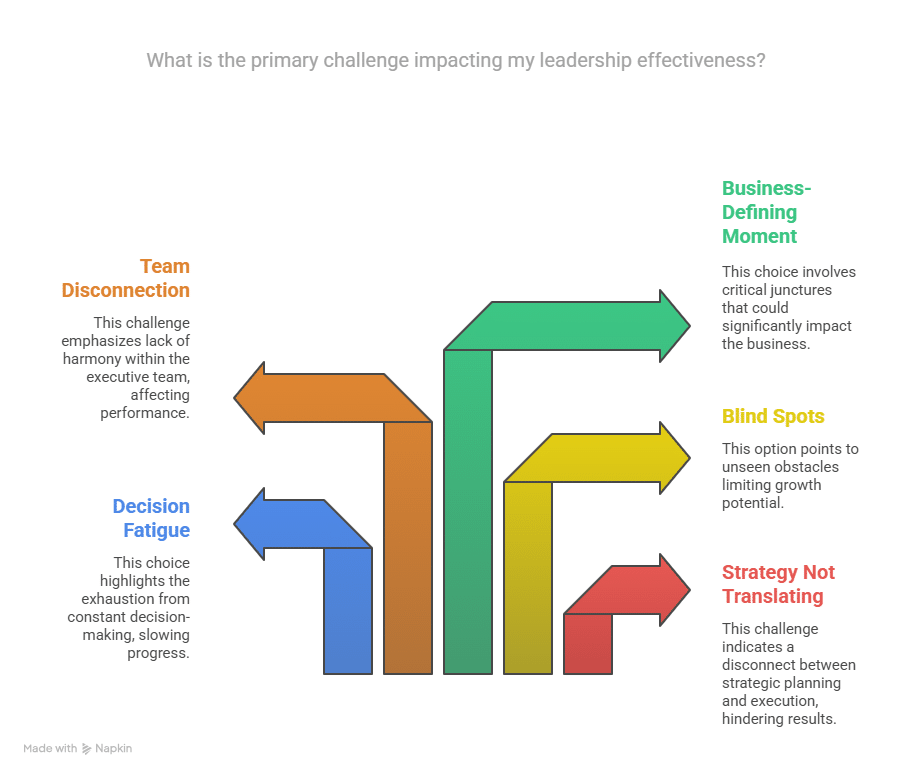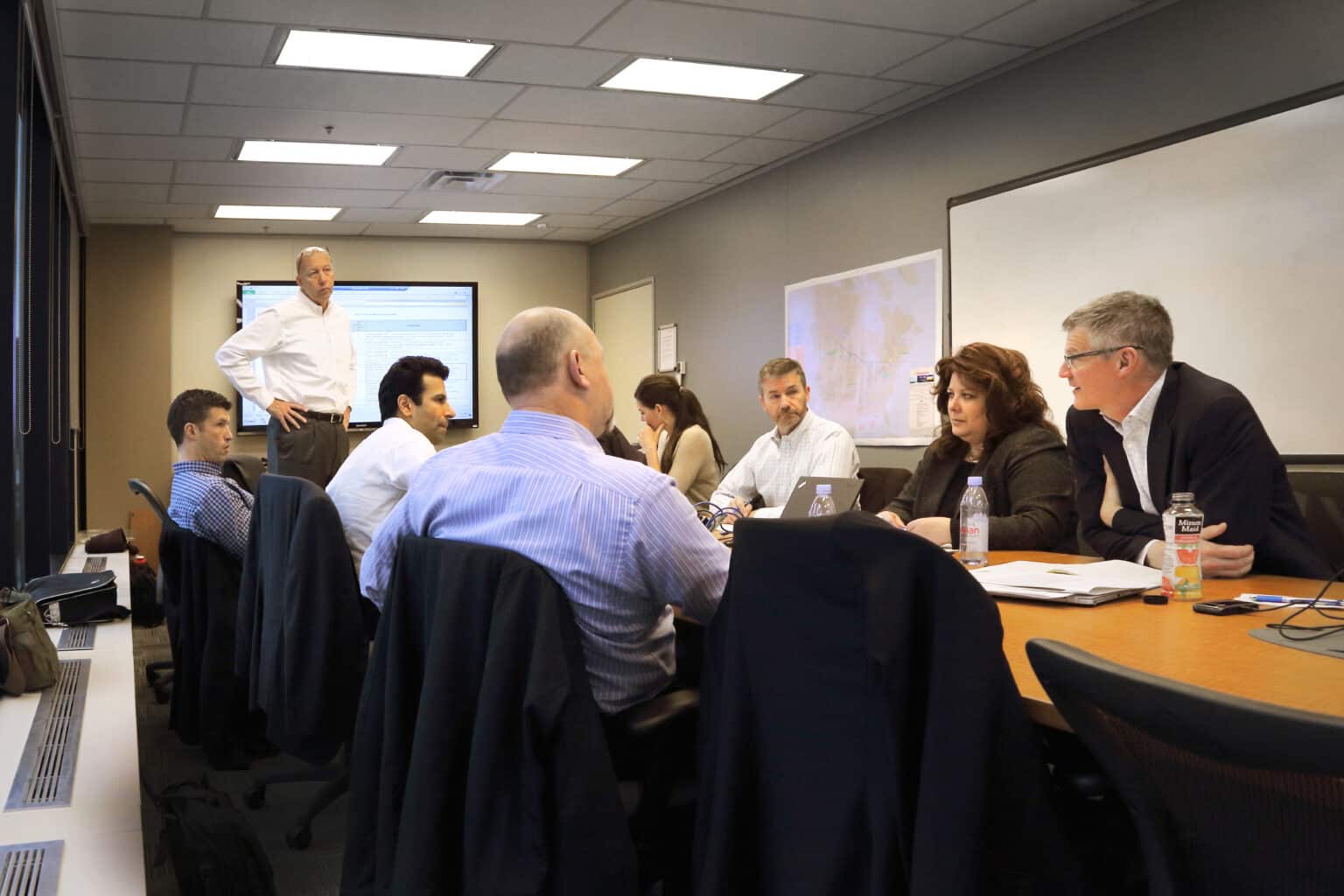Executive coaching for CEOs has evolved. It’s not a last-ditch effort—it’s a smart, strategic move. Today’s top leaders don’t wait for burnout or breakdown. They invest in coaching to gain clarity, sharpen execution, and accelerate growth.
If you’re a CEO carrying the weight of strategy, performance, and culture, you’ve likely asked: Am I doing enough? Why isn’t this clicking like it used to?
Those aren’t doubts—they’re signals. And when addressed through coaching, they unlock real transformation. In fact, many leaders who benefit from executive coaching say it’s the single most important lever for sustainable performance.
Below, we outline five signs it’s time to bring in a coach—and what that decision can unlock for you and your business.
Overview: The 5 Key Signs It’s Time for Executive Coaching for CEOs
These are the inflection points where executive coaching for CEOs has the biggest impact:
- Strategy isn’t translating into results
- Decision fatigue is slowing you down
- Blind spots are limiting your growth
- Your executive team is out of sync
- You’re facing a business-defining moment

1. Your Strategy Isn’t Translating Into Results
You’ve put in the work. You’ve clarified the vision. Everyone nodded along at the offsite. But now? Timelines slip. Priorities compete. Execution stalls.
This disconnect between strategy and execution is one of the most common challenges CEOs bring to coaching. As outlined in a performance scorecards framework from Forbes, even the best-laid plans can fall short without attention to the systems behind them—KPIs, accountability, and communication rhythms.
Without intentional alignment, execution starts to drift. Coaches help leaders align your team around shared goals, creating clear expectations that cascade through the organization.
Coaching helps CEOs zoom out and realign their organization. Harvard Business Review refers to this as the triangular relationship in coaching—linking CEO development with organizational performance through partnership between coach, coachee, and company.
2. Decision Fatigue Is Slowing You Down
You make hundreds of decisions per week. Some are critical. Many are nuanced. Over time, even the best decision-makers hit a wall.
When every decision comes through you, your team stalls. Coaching helps you delegate without losing control by teaching you to build structures around decision ownership, filters, and frameworks.
You might notice:
- Mental exhaustion
- Shortened attention span
- Delayed decision-making or over-analysis
- A growing sense that you’re “in the weeds” too often
This is decision fatigue. And it doesn’t just slow you down—it compromises your judgment.
Most CEOs don’t need more hours in the day—they need better clarity on where to spend their attention. That’s where executive coaching for CEOs becomes a performance lever, not a personal fix.
3. Blind Spots Are Limiting Your Growth
Every leader has blind spots. But as CEO, yours have more impact—and fewer people willing to point them out.
CEO self-awareness becomes critical at this level. When coaching clients first start, they’re often surprised by what they’ve been tolerating:
- Avoiding difficult conversations
- Reacting emotionally under pressure
- Micromanaging without realizing it
- Confusing confidence with clarity
Through consistent coaching, CEOs become more self-aware, grounded, and emotionally intelligent. McKinsey & Company describes this as human-centric leadership—a mindset focused not just on results, but on adaptability, growth, and team cohesion.
Coaching cuts through that. It creates space for honest reflection. Gallup’s research into universal leadership behaviors reinforces this point: top leaders prioritize feedback, reflection, and self-development as strategic assets.
Executive coaching for CEOs isn’t about finding flaws—it’s about surfacing patterns and recalibrating what great leadership looks like in your context.
4. Your Executive Team Is Out of Sync
You’ve hired strong leaders. But something’s off. Projects stall. Silos grow. Conflict simmers under the surface—or erupts when stakes are high.
Misalignment at the executive level slows decision-making. Coaches help CEOs build high-performing teams by resetting expectations, facilitating conflict resolution, and creating space for clarity.
This isn’t just frustrating—it’s dangerous. Misalignment creates fragmentation across the org.
Coaches help CEOs evaluate their leadership teams from the outside. According to Boston Consulting Group’s insights into transformational change coaching, aligning leaders around shared goals can boost transformation success rates by over 70%.
This is one of the most measurable outcomes of executive coaching for CEOs—bringing team dynamics back into strategic alignment so the business can move faster, smarter, and stronger.
5. You’re Facing a Business-Defining Moment
Not all moments in business are created equal. Some shape the company for years to come. These moments demand a different version of leadership.
You might be:
- Entering a new market
- Managing a reorg or merger
- Replacing key leadership
- Recovering from a major mistake
- Planning for succession
- Re-evaluating your own role as CEO
Transitions create ambiguity. Coaching creates leading through change. Coaches provide frameworks to clarify thinking, sharpen communication, and reduce emotional volatility.
Executive coaching for CEOs can serve as an anchor in uncertain times—re-centering your mindset so your message and mission don’t get lost in the noise.
Real-World Example: How Executive Coaching Shaped Microsoft’s CEO
When Satya Nadella became CEO of Microsoft in 2014, he inherited a company weighed down by internal silos, slowing innovation, and a culture in need of transformation. Recognizing that leading change would first require personal change, Nadella turned to executive coaching for CEOs.
Through that process, he focused on developing empathy as a core leadership value. He began rethinking how leaders communicated, collaborated, and made decisions. Coaching helped Nadella shift Microsoft’s culture from one of internal competition to cross-functional alignment and innovation.
The Results:
- Market Value Growth: Microsoft’s value climbed from ~$300B in 2014 to over $2 trillion by 2021
- Cultural Shift: The company went from defensive and siloed to adaptive, learning-focused, and inclusive
- Innovation Surge: With coaching-supported leadership clarity, Microsoft doubled down on cloud services and became a dominant force in AI and enterprise software
Nadella’s story is proof that executive coaching for CEOs isn’t just a personal growth tool—it’s a business accelerator.
Frequently Asked Questions (FAQs)
How do I know if executive coaching is right for me?
If you’re facing stalled execution, decision fatigue, or team misalignment—and you’re ready to grow as a leader—executive coaching for CEOs can help. It’s not about needing help; it’s about wanting to lead with more clarity, confidence, and intention.
What do CEOs really want from coaching?
Most want clarity, confidence, and space to think. Coaching gives CEOs a confidential place to work through big decisions, receive honest feedback, and sharpen how they lead.
What are the 3 C’s of coaching?
Clarity, Confidence, Commitment. Coaching helps CEOs define what matters, act decisively, and stay accountable to themselves and their teams.
What does a CEO coach actually do?
A CEO coach acts as a strategic thought partner. They challenge your thinking, support your goals, and guide you through both internal and external leadership shifts.
Why is executive coaching for CEOs important?
Because you’re the pace-setter. When you grow, the business grows. Executive coaching for CEOs helps leaders think sharper, lead better, and make high-quality decisions faster.
5 Signs It’s Time for Executive Coaching for CEOs: Conclusion
If you’ve read this far, one thing is clear: You care deeply about how you lead.
Executive coaching for CEOs isn’t about adding another meeting to your calendar. It’s about investing in the one thing that drives every outcome in your business—your leadership clarity and capacity.
Whether you’re navigating complexity, feeling stretched, or simply ready to reach the next level, coaching offers a direct, strategic path forward.
👉 Book your free 30-minute consultation with with a Champion PSI Coach and take the next step toward high-performance leadership.










